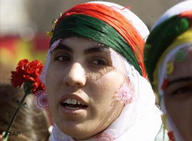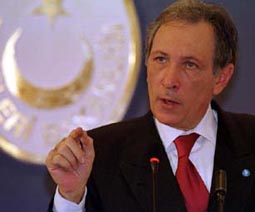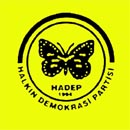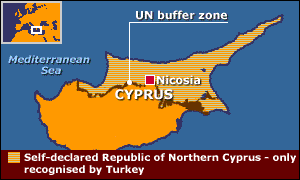19
July 2002
![]()
2. "Turkey's Cem says his party will be EU driving force, not optimistic on quick reforms", Turkey's former foreign minister said Friday he was rushing to organize his new party before elections and added that he was not optimistic that Turkey would achieve crucial European Union reforms before the balloting.
3. "HADEP gives a conditional “yes”, HADEP General Chairman Murat Bozlak stated that in case that laws on political parties and elections were amended and adjustment laws were passed they would approve the date November 3.
4. "Cyprus 'invasion' problem knocking on Turkey's door", Kabaalioglu: EU states back each other, right or wrong.
5. "Turkey's Islamist party on the verge of breakthrough", a moderate Islamist party led by a man convicted of inciting religious hatred is a favourite to win new elections in officially secular but overwhelmingly Muslim Turkey. The Justice and Development Party (AK), formed from the remains of two banned Islamic parties, is led by former Istanbul mayor Recep Tayyip Erdogan, who insists he is not an Islamist.
6. "Turkey awards million-dollar chopper deal to Israel", Turkey has chosen an Israeli company to modernize some 300 helicopters in its air force under a multi-million-dollar contract which will be signed in Ankara on Friday, a defence industry official said. The 110-million-dollar (euro) project, awarded to the state-owned Israeli Military Industries (IMI), involves the installation of electronic warfare systems on board the helicopters, including laser, missile warning systems and jammers, the official told AFP on condition of anonymity.
1. - The Guardian - "Homeless and friendless":
The war against terrorism is stifling Kurdish aspirations for their own nation, just as their activists have begun to reject violence
19 July 2002 / by Owen Bowcott 
The war against terrorism has been hard going for the Kurds. One
of the world's largest ethnic groups not to have a home state, they
form a minority - and face varying degrees of intolerance - across the
Middle East, in Turkey, Iraq, Iran and Syria.
The west's twin campaigns against al-Qaida and Saddam Hussein threaten to undermine the Kurds' nationalist aspirations. Pressure from Washington on the protected Kurdish enclaves in northern Iraq to provide frontline fighters to remove "the butcher of Baghdad" has been widely reported. So far, the Iraqi Kurds have hesitated to compromise their precarious autonomy in order to satisfy the Bush administration's enthusiasm for a new world order.
Little has changed for the Kurds of Iran and Syria. But the impact of the war against terrorism on the Kurds of Turkey has been more subtle. The Kurdistan Workers party (PKK), which has begun the process of putting away its weapons and transforming itself into a political movement, has been added to a European Union list of banned organisations. Turkey's Kurds normally look to Europe for helpful human rights interventions while hoping that accession to the EU will at result in better treatment for minorities.
For the PKK, renouncing the gun has been a protracted process. The outmanoeuvred organisation began winding down its guerrilla campaign aimed at carving out a homeland in south-east Turkey and northern Iraq in 1999 after Turkish special forces seized the PKK's fugitive leader, Abdullah Ocalan. Two years ago the PKK - a secular, Marxist group with no known connections to al-Qaida - announced a ceasefire.
Europe's condemnation of the organisation has been a demoralising blow, particularly for the Kurdish diaspora which tries to promote the cause of independence. The conclusion that democratic politics pay better dividends than violence is now being re-examined.
The enthusiasm among western states for drawing up lists of outlawed groups predates September 11: a ban on the PKK and 20 other groups was announced by the home secretary under the Terrorism Act in March 2001. Civil rights lawyers argue the legislation is so restrictive that had it been in force during the apartheid era the African National Congress would not have been able to organise in Britain.
The fervour with which banned lists have been assembled since President Bush launched the war against terrorism has intensified. In the scramble to coordinate security, there has been sustained lobbying from some states to ensure local opponents become outcasts. Turkey has been a persuasive lobbyist.
"This EU ban...criminalises the whole of the Kurdish people," says Remzi Kartal, a Brussels-based member of the executive council of the exiled Kurdish National Congress (KNC). "If Europe and the international community try to close down the liberation movement in the same way as the Turkish government does, then that leaves no alternative but to begin the war again."
His threat is significant. The KNC is the umbrella organisation which brings together numerous Kurdish political groups. The PKK was a leading member until it formally dissolved itself in April. The movement reinvented itself as the Kurdistan Freedom and Democracy Congress (Kadek), this time promising: "No bombs. No violence." Kadek is now part of the KNC.
The Turkish military response to the EU ban was to launch its summer search-and-destroy operations against pockets of PKK guerrillas in Tunceli, eastern Turkey, and into Iraq. Another part of the establishment, possibly the intelligence service, MIT, began leaking lists of allegedly pro-Kurdish organisations it would also like banned. Among names which surfaced in an Ankara paper were the Kurdish Human Rights Project, a London-based civil rights group, the European Council of Churches and the charity Medicins sans Frontieres. All three condemn the use of violence.
On the other hand, Turkey's parliament - facing an early election to end months of political instability triggered by Prime Minister Bulent Ecevit's illness - has voted to lift emergency rule in two predominantly Kurdish provinces, endorsing a decision by the military-dominated national security council. The EU insists that emergency rule in four remaining provinces ends before Turkey opens membership talks with Brussels.
The European parliament in Strasbourg is meanwhile trying to impose a requirement on Turkey that it opens up dialogue with Kurdish organisations. Under the "Copenhagen criteria" for joining the EU, Turkey must also remove restrictions on the use of the Kurdish language. This and other reforms are cooling the enthusiasm of some Turkish politicians and military officials for Europe.
Channelling efforts into constitutional politics would not be so difficult for the Kurds in Turkey if they could organise politically. The movement has encouraged demonstrations by students demanding lessons in Kurdish, but that usually results in mass arrests. Language reforms, promised by successive Turkish politicians, have never materialised.
The PKK ceasefire has elicited little response from the authorities. Leyla Zana and three other Kurdish MPs from the Democracy party have been imprisoned since 1994 for allegedly having links with the PKK. The European court of human rights again condemned their detention last month.
One problem is the curious configuration of the Turkish state, in which the national security council plays a pivotal role. In 1997 the military ordered the Islamist party then in power to resign, effectively a coup in which tanks stayed inside the barracks.
The Turkish general staff is opposed to dismantling the
geographical boundaries or the secular nature of the state, and the
Turkish army remains a key regional ally for the US, Israel, Britain
and Nato. Airbases, such as Incerlik, are used daily by UK and US air
patrols monitoring the no-fly zone in northern Iraq, and would be vital
for an attack on Saddam Hussein. With such high stakes in play, the
interests of the Kurds - in both Turkey and northern Iraq - are in danger
of slipping down the west's diplomatic agenda. ![]()
2. - AP - "Turkey's Cem says his party will be EU driving force, not optimistic on quick reforms":
ANKARA / 19 July 2002 / by Suzan Fraser 
Turkey's former foreign minister said Friday he was rushing to organize
his new party before elections and added that he was not optimistic
that Turkey would achieve crucial European Union ( news - web sites)
reforms before the balloting.
In an exclusive interview with The Associated Press, Ismail Cem, who defected from Prime Minister Bulent Ecevit's party earlier this month along with some 60 other legislators, said his party would be a driving force for EU reforms.
"As a party, I think that we will be the leading force in (the EU) venture," said Cem, looking relaxed but tired a day after setting off on his first campaign trip to his electoral district in Kayseri, central Turkey.
"We will try to achieve (the reforms) though I am not very optimistic for the next two or three months prior to the elections," Cem said.
Cem, with graying hair, but looking more youthful than his 62 years, has been Turkey's foreign minister since 1997. His term in office will be best be remembered for forging closer ties with traditional rival Greece and overseeing Turkey being made a formal candidate for EU membership in 1999.
Turkey is now struggling to push through crucial democratic reforms for EU membership. The nationalist party, a member of Ecevit's coalition government, is opposed to steps such as abolishing the death policy and legalizing education and broadcasts in Kurdish.
Turkey needs to pass some of the reforms before October, when the EU is due to issue a report on Turkey's progress and before December when a EU summit could set a date to open membership talks with Turkey.
"I don't believe that everything will be lost if we don't manage (to pass reforms) within the next two or three months ... but it will cause us a delay," he said.
Cem is scrambling to put together his party before elections likely to be held in November. The grouping will almost certainly include the more than 60 defectors as well as Kemal Dervis, the popular economy minister who is the architect of Turkey's economic recovery program.
Parliament is due to meet next week to vote on elections for November, though it was not clear the two parties who called for the session would get a minimum quorum. That leaves Cem and his colleagues very little time to prepare.
"It is a race against time," he said.
The defections from Ecevit's party have stripped the government of its absolute majority and have called into question whether the government can last for much longer.
Cem said he did not know if more defections would follow and lead to the collapse of the government.
"We don't insist, we don't call, we don't even ask," he said.
Cem indicated that the party would be respectful of religious beliefs but remain loyal to Turkey's secular principles.
"We have a formula: we say a secularism which is respectful of religious sensitivities. That is exactly what we will do," he said.
Turkey has strict secular laws that sometimes lead to
social tensions. Islamic head scarves, for example, are barred for university
students and public sector workers. The ban has created intense political
controversy. ![]()
3. - Kurdish Observer - "HADEP gives a conditional “yes”:
HADEP General Chairman Murat Bozlak stated that in case that laws on political parties and elections were amended and adjustment laws were passed they would approve the date November 3.
18 July 2002 / by Bermal Kocgiri 
HADEP General Chairman Murat Bozlak stated that in case that laws
on political parties and elections were amended and adjustment laws
were passed they would approve the date November 3.
Bozlak first of all commended on their insistence on October 6 as the date of elections, saying that the reason of it was their opinion that the existing government could eliminate the block before the European Union. Stressing that they were not convinced that the parliament could take serious steps towards democratisation, Bozlak mentioned that they wanted to save time for the new parliament. “Therefore the Assembly should convene not at September 1 but at an earlier date. However we have expressed that before the elections laws on political parties and elections should be amended,” said the HADEP Chairman, “If the parliament convenes at the beginning of August, it is possible to amend the laws on political parties and elections and adjustment laws. Alliances should be made possible and the impediment of 10% representation which is the biggest obstacle before the public will should be eliminated.”
Making a call to political parties represented in the parliament, Bozlak said the following: “We wish legal adjustments which will secure justice in representation, realization of public will in the parliament and a just election.”
“Laws on elections should be democratised”
On the other hand unions and political parties asked for laws on political parties and elections to be amended.
Committee of Chairmen of the Labor Platform, in a meeting in Yalova, stated that there was an “unexpected” early election because of artificial decompositions. “An election with the present political parties will not be new. The election should be made after the laws are amended and taking international problems into consideration,” said the statement.
And Rifat Hisarciklioglu, Chairman of the Turkish Union of Chambers and Stock Exchanges (TOBB) also asked for the said laws to be amended. The Chairman stressed that the adjustment laws and tax laws should be amended as well.
Association of Businessmen and Industrialist in South East (GUNSIAD) released a written statement on the matter, saying that young cadres should take over the power. And Mehmet Bekaroglu, Deputy Chairman of Saadet Party pointed out that they would support the early elections only after the said laws were amended. “A new government for election should be formed,” said Bekaroglu.
Abdullah Gul, Deputy Chairman of AKP made a press conference,
saying that Prime Minister Bulent Ecevit and the government should resign
“according to the democratic rules and democratic ethics”.
Gul expressed that the early election was unavoidable, adding that they
did not find convincing that the parties in power decided to make elections
on November 3. ![]()
4. - Turkish Daily News - "Cyprus 'invasion' problem knocking on Turkey's door":
Kabaalioglu: EU states back each other, right or wrong
ANKARA / 19 July 2002 / by Ozgur Eksi 
Turkey, considered by Greece to have "invaded" the island
of Cyprus, will be asked to withdraw its troops from "European
Union territories" in the near future, if Greek Cypriots access
European Union membership and if no solution is reached between the
two states on the island before then. Turkish Republic of Northern Cyprus
(KKTC) President Rauf Denktas continues the negotiations with his Greek
Cypriot counterpart Glafcos Clerides over the future of the island,
even though the EU claims that Greek Cyprus will become an EU member
regardless of whether negotiations succeed or fail. The attitude displayed
by the EU regarding the dispute between Spain and Morocco over the tiny
island of Perejil/Leila hints that Turkey may face many serious problems
in the near future, since the EU "backs" its members fully.
Foreign diplomats prefer silence
A Greek diplomat, close to Turkish-Greek relations and to the EU and Cyprus issue, when asked, "What if Greek Cyprus is granted EU membership without an agreement between Denktas and Clerides? Brussels and EU term president Denmark are fully supporting Spain, do you think something similar may happen on the island?" simply said, "why so much pessimism?" and stated that he hoped there would be an agreement on the island. The Greek diplomat did not want to accept that there was a parallel between the two issues, but also refused to deny it. Instead, he said, "no one would like to answer such a question."
The Greek diplomat would only sum up how Greece saw the issue: "Cyprus will hopefully access EU membership, and there are Turkish troops on the island that we do not want to stay."
Another EU official, who is following Turkey's progress closely, stated that he did not want to speculate on the subject, saying that he was very hopeful that an agreement would be reached on the island. He responded to the question, "are you afraid of something similar happening to Turkey, whereby Turkey would be asked to withdraw its troops?" by saying, "No, we are hopeful that there will be an agreement on the island." When asked, "if an agreement is not reached, then what?" he said he could not talk about the situation any further.
Meanwhile, the EU Turkey Commission stated that the Perejil and Cyprus issues were "not comparable."
EU backs Spain demonstrating EU solidarity
Yeditepe University domestic law professor Haluk Kabaalioglu stated that Turkey pointed to the "Guaranty Agreement" in order to defend Turkish rights in Cyprus. According to Kabaalioglu, this policy will not last forever because it will expire with Greek Cypriot accession to the EU. "Even if it is valid, it has no power because Turkey waited until 1974 to intervene on the island. This guaranty treaty is not a very strong argument on its own," Kabaalioglu added.
The EU is a club and members support each other in the name of EU solidarity, according to Kabaalioglu. "This is a solidarity. They do it even if they know the member is not right, not just, because it is EU solidarity. They support them because they think the same might happen to them one day," Kabaalioglu said.
Stating that Morocco was trying to secure the island in order to control illegal emigration to Europe -- something which would help the EU stop illegal immigration -- Kabaalioglu said that Spain and the EU would not listen, even if it was only a tiny island.
Kabaalioglu also indicated the path that Turkey should follow: "Turkey must have a timetable with Bulgaria and Romania. This date will be 2008. Greek Cypriots are much more fanatical than Greeks. They will prevent Turkey's accession to the EU forever." Kabaalioglu said that the current situation on the island did not match the Copenhagen Constitution. "The EU should put Greek Cyprus on the waiting list," he added.
The story of Perejil/Leila
An island, not quite as big as a soccer field, known in Spain as Perejil and as Leila in Morocco, has caused a major diplomatic crisis. It seems to be frozen for now, since Spanish forces have evicted a unit of Moroccan soldiers from the island. Denmark, which holds the EU term presidency, said it was "concerned about the situation created by Morocco on the island of Perejil." According to Denmark, the EU, "expresses its full solidarity with Spain and urges Morocco to immediately withdraw its forces" from the island.
European Commission President Romano Prodi stated that he considered this to be a problem which essentially required a bilateral solution, but which concerned the EU as well, because the Spanish government asked the commission president to enter into contacts with the prime minister in order to express Europe's grave concern over a possible escalation of the issue.
The Greek or Greek Cypriot prime minister, after the island
gains EU membership, may call for action against Turkey, since Turkey
is "invasive." When two pictures, one of Perejil and one of
Cyprus, are put on the table, the EU may not have many options. ![]()
5. - AFP - "Turkey's Islamist party on the verge of breakthrough":
ANKARA / 18 July 2002 / by Florence Biedermann
A moderate Islamist party led by a man convicted of inciting religious
hatred is a favourite to win new elections in officially secular but
overwhelmingly Muslim Turkey. The Justice and Development Party (AK),
formed from the remains of two banned Islamic parties, is led by former
Istanbul mayor Recep Tayyip Erdogan, who insists he is not an Islamist.
But the 48-year-old has also called for a referendum to rein in alcohol
use and says family planning is a betrayal of the state, where the army
has often intervened to ensure Turkey remains secular.
A poll published Thursday in the Hurriyet newspaper put AK as the front-runner for the next elections, which Ecevit was forced to call on Tuesday after a mass revolt left him without a majority in parliament. Support for the ailing 77-year-old had been crumbling for weeks, with a political crisis sparked by EU-demanded reforms further undermining confidence in an already shaky economy. The AK party was formed less than a year ago by moderates from the popular Islamist party Virtue, which itself was founded out of the remains of another banned pro-Islamic party. AK immediately signed up more than 50 siting MPs.
With more than 20 parties banned in Turkey in the last four decades, AK has since tried to re-position itself as a centre-right movement and has played down its Islamist roots. Meanwhile Erdogan argues his ban from politics -- part of his 1998 conviction for reading a poem in public that the courts said fanned the flames of religious hate -- was annulled by a 1999 amnesty. The constitutional court has ruled the amnesty does not apply to him and has given the AK until October to remove him as chairman, leaving his political future in doubt.
Erdogan is also currently on trial for alleged financial
irregularities. He could spend up to 14 years in prison if convicted.
Despite all that, the AK has been able to appeal to voters who have
seen the leading figures of Turkish politics -- who have made their
way from one government to the next -- embroiled in corruption scandals.
There is also widespread anger over the economy, which is still stumbling
through its worst recession in half a century despite a vast recovery
programme backed up by 16 billion dollars in IMF loans. ![]()
6. - AFP - "Turkey awards million-dollar chopper deal to Israel":
ANKARA / 19 July 2002
Turkey has chosen an Israeli company to modernize some 300 helicopters
in its air force under a multi-million-dollar contract which will be
signed in Ankara on Friday, a defence industry official said. The 110-million-dollar
(euro) project, awarded to the state-owned Israeli Military Industries
(IMI), involves the installation of electronic warfare systems on board
the helicopters, including laser, missile warning systems and jammers,
the official told AFP on condition of anonymity.
Turkey's state-owned ASELSAN firm will work on the project with IMI as a co-contractor, she said. The official added that Turkish and Israeli officials are scheduled to sign off on the deal in the Turkish capital on Friday. The helicopter deal is the second defence contract predominantly Muslim but strictly secular Turkey has awarded to the Jewish state this year. In March, IMI was chosen to upgrade 170 US-made M-60 tanks under a contract worth some 670 million dollars.
The decision had attracted a wave of criticism at home, especially from Islamist opposition parties, and calls for the deal to be scrapped due to Israel's military operations against the Palestinians. Turkey has been Israel's chief regional ally since 1996 when the two countries reached a military cooperation accord, much to the anger of most Arab nations and Iran.
Ankara, which has the biggest army in NATO after Washington,
its main arms supplier, originally planned to spend some 150 billion
dollars to modernize its army over the next 30 years. But severe financial
turmoil in November 2000 and February 2001 has forced the postponement
of a number of projects including a tender for 145 combat helicopters
and another for 1,000 tanks.![]()